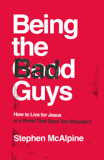
The Christian message used to be like that spoonful of cod liver oil that mothers forced upon their children. It wasn’t so tasty—it was downright awful, in fact—but that merely proved it was doing something good, right? “Love your neighbour”, and all that.
Popular opinion viewed the gospel message as something essentially good that would ensure bad people got better. It would help people put unhealthy habits behind them and start living a moral life. Even if you didn’t take that Christian thing seriously yourself—even if you turned your nose up at it like a spoonful of cod liver oil—you knew it was good for what ailed your culture.
No longer. Not only does the Christian gospel not come in capsule form like cod liver oil now does (thankfully!), but the contents of that spoon are viewed as poison—bad for you! Take the gospel at your peril. It will kill you. It will not make you healthier, but sicker. And the same goes for the culture around you.

How we came to live in a post-Christian culture and how to live for Jesus in it.
You don’t have to look too far on social media, or even mainstream media (or, closer to home, you don’t have to talk for long to colleagues, study partners or family members), to find people who, upon hearing you are a Christian, wrinkle up their noses as if they have caught a whiff of cod liver oil.
What has happened? How did we get there? How did we arrive at a place where the good news of the gospel is increasingly considered bad news? And what do the proponents of that view really mean: if it is bad news, what is bad about it, and for whom is it bad?
This shift is what I explore in my new book Being the Bad Guys: How to Live for Jesus in a World That Says You Shouldn’t. The reason for it is this: We are witnessing a clash between two opposing gospels. There are two competing versions of what the good news is for modern humanity, and they are on a collision course. The Christian gospel does not come into neutral territory when it meets the post-Christian culture.
The post-Christian gospel which I will outline assumes all of the categories of the Christian gospel—saint/sinner, redemption/salvation, perdition/glory—but fills those categories with completely different ideas. And there is a new cultural priesthood available to spread this good news across a wide variety of media.
The primary evangelistic message of this new gospel is that the old gospel is, well, old! It has had its day. And it failed. We need to get rid of it if we are to shake off the violence, abuse and institutional authoritarianism of the past, and create a flourishing, healthy and loving, not to mention diverse, future.
The contrast between these two gospels is increasingly promulgated through the narratives of popular culture and Silicon Valley, the legislation of political culture, and the verdicts of legal culture. The Christian gospel has been weighed in the balance of culture, politics and law, and found wanting.
"Unless you have a clear picture as to why there is so much hostility towards the Christian message today, you will have zero chance of engaging with those who need to hear it."
The new gospel says that we make our own moulds. And our bodies are the receptacles by which we do this. This is why sexual freedom and gender identity matters are such hot topics in our culture. That the body must be liberated from all constraint is the creed of this new gospel; to mess with this creed renders you a heretic.
Now if that sounds like I am laying it on a bit thick, then consider how someone who thinks that way views the Christian message you wish to share. They are not thinking “good news”!
Think about your gay work colleague who is helping plan the Pride celebration for the HR team. Think about your fellow students doing that group assignment on the history of Western slavery. Think about that young progressive journalist who is doing an article on your church’s meal delivery outreach during COVID lockdown.
None of them is thinking that the Christian gospel is good news or liberty. All of them are thinking that it has had its day and the sooner it is replaced with this better story, the better. And if Christianity is to survive in any form then it must launder out its call for repentance and holiness, the exclusivity claims of Jesus, the miracle stories, etc. It must sign up to the rights agenda as defined by the cultural movers and shakers. If not, then Twitter will be set loose upon it.
Which all means that when the Bible says of Christians in 1 Corinthians 6 v 20, “You are not your own; you were bought with a price”, we’ve got a hard sell showing a modern young person why that is going to liberate them. You can see why outright hostility is the response to that gospel, not merely casual indifference.
Unless you have a clear picture as to why there is so much hostility towards the Christian message today, you will have zero chance of engaging with those who need to hear it. Unless you realise that your gospel message is competing with an alternate gospel message, which you need to wisely and sensitively deconstruct if you are ever to get a hearing, then you will constantly be dismayed at how little traction you get. You will constantly be affronted by the anger that greets you.
Yet I believe that this alternate gospel is a facade. It looks good on the surface and it seems to offer a new and better version of life and liberty, but the stats suggest otherwise. The levels of anxiety, loneliness and insecurity in our modern world, in which the individual is supreme, suggests that something is wrong. It suggests that we are merely papering over the cracks when we celebrate sexual autonomy and diversity at the myriad Pride parades sponsored by governments and communities around the West. The government can throw as much money at it as it wants, but this new gospel requires a lot of propping up. It needs a lot of noise and a lot of support just to help it stand up to the winds of reality.
So the gospel we proclaim had better look as good in practice as it says it is on the tin. In other words, it had better be better than that alternative gospel! It had better do relationships better. Forgiveness better. Love better. Service of others better. Sexuality better. Celibacy better. Hope for the future better. Justice better.
If we are going to say that we have a better gospel story than the alternative being promoted, then it had better be better!
This supposed cod liver oil had better have the aroma of Christ about it. We need to get our own house in order. The gospel is good for what ails us as a culture, and it is our task to proclaim it and practise its implications—so that a tired, sick society may look once again to the good news of Jesus for the spiritual health it needs.